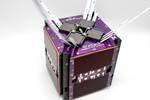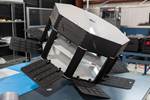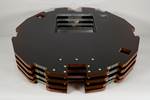Siddus Space launches composites-intensive LizzieSat satellite
LizzieSat offers space-based data collection and analysis for SpaceX’s Transporter-10 Rideshare mission.
LizzieSat satellite. Source | Sidus Space
(Cape Cavaveral, Fla., U.S.) a multi-faceted space and data-as-a- service satellite company, has announced that its LizzieSat satellite has successfully launched and deployed to low Earth orbit (LEO) as part of SpaceX’s (Hawthorne, Calif., U.S.) Transporter-10 Rideshare mission. Liftoff occurred at 2:05 p.m. PDT from Space Launch Complex 4 East at Vandenberg Space Force Base in California.
LizzieSat uses Onyx FRA along with continuous carbon fiber to reinforce the satellite structure and parts. The former is a flame-retardant variant of Onyx, Markforged’s (Waltham, Mass., U.S.) 3D printing material that can be reinforced with any continuous fiber.
LizzieSat is positioned to enable space-based data collection and analysis via its Space Platform with a Purpose and FeatherEdge AI integration. This mission aims to broaden its customer base across military and commercial sectors, offering tailored intelligence solutions for industries such as defense, agriculture, maritime, and oil and gas. Sidus Space anticipates upcoming missions, with LizzieSat-2 and LizzieSat-3, expected to launch on future SpaceX Rideshare missions.
, Transporter-10 carries “multiple smaller payloads for a large number of customers. These launches offer a convenient and more affordable way for private companies to place satellites into orbit without the needing to wait and ‘tag along’ on the launch of a larger spacecraft.”
Related Content
-
Scaled Composites Model 437 aircraft to be flown for Beacon autonomy testbed
Northrop Grumman subsidiary part of Digital Pathfinder development of stealth aircraft with wings using continuous carbon fiber additive manufacturing and determinate assembly.
-
Orbital Composites wins AFWERX award for Starfighter drone fleet
Under the TACFI contract, Orbital is implementing the AMCM process to build 3D printed composite multi-mission UAS aircraft, surpassing $10 million in government awards.
-
Al Seer Marine, Abu Dhabi Maritime unveil world’s largest 3D-printed boat
Holding the new Guinness World Record at 11.98 meters, the 3D-printed composite water taxi used a CEAD Flexbot to print two hulls in less than 12 days.



